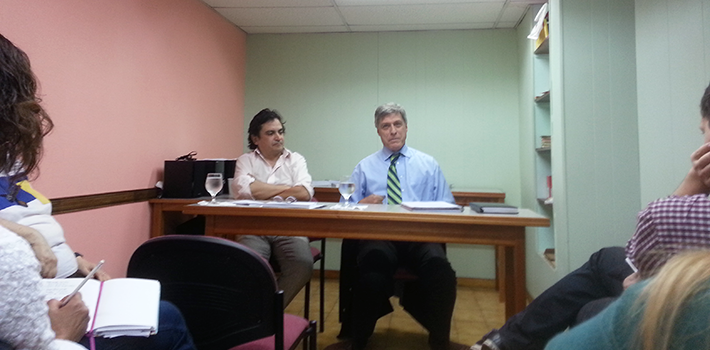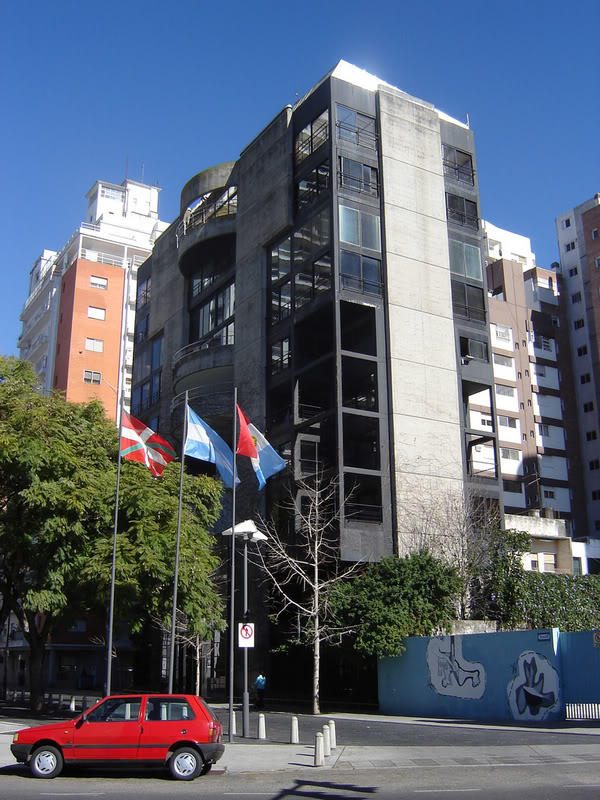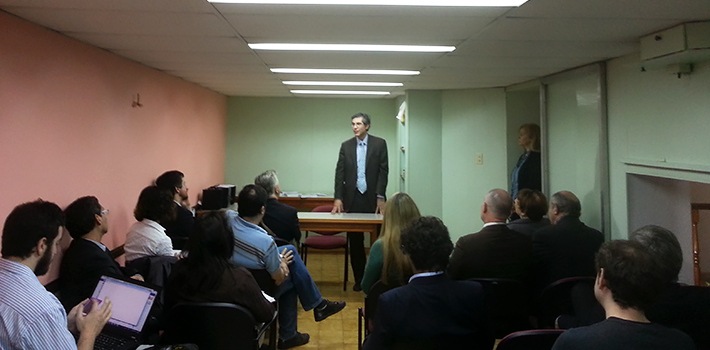EspañolAlthough Argentina is still one year removed from the 2015 presidential election, the apparent lack of an electoral candidate advocating limited government and a free society has raised concerns.
However, where politicians have failed to deliver, a growing number of Argentinean nonprofit organizations are filling the void. Many of Argentina’s pro-free society think tanks have recently emerged as influential opinion leaders, providing a platform for ideological debate and promoting political awareness across the country.
Recently, the directors of Argentina’s three most prominent classical liberal think tanks joined forces with former Minister of Economy Ricardo Lopez Murphy to host a conference attended by representatives of 24 organizations that advocate for a free society.
The conference was held on Wednesday, August 20, in the old Buenos Aires neighborhood of San Telmo, and sponsored by the Friedrich Naumann Foundation.
“The goal is to communicate our objective and strengthen our network with one partner organization in each Argentinean province,” said Alberto Medina Mendez, president of the Freedom Foundation in the Corrientes province and one of the event promoters.
Meet the Founders

Freedom Foundation (FF) President and Cofounder Gerardo Bongiovanni stressed the necessity for “recognized and established institutions” to promote liberal ideas.
Headquartered in an imposing building set along the banks of the Parana River in the city of Rosario, the Freedom Foundation was founded 26 years ago and is now widely considered Argentina’s leading liberal think tank. The foundation’s 40 employees and 350 business partners make it the largest liberal think tank in the country and a rallying point for mainstream politicians and intellectuals from around the country.
According to the 2013 Global Go To Think Tank Index (GGTTI), an index compiled annually by the University of Pennsylvania to evaluate the quality, commitment, and reputation of think tanks worldwide, FF is ranked 108 of 6,826 listed organizations, and enjoys the title of top-rated think tank in Argentina.
According to Bongiovanni, the keys to FF’s success are the ability to engage people through “modern managing and marketing,” and a focus on “not simply defending the culture of freedom in strictly practical terms.”
However despite the FF’s well-documented influence over the decades, Bongiovanni notes that the foundation has a long way to go in making its message heard. Thus far, he considers “the result of liberal action disappointing,” and cites the current state of the Argentinean economy as evidence.
The president of the FF noted the importance of “not simply defending the culture of freedom in strictly practical terms.”
“In Chile, they have begun a process that questions [the free-market system] because of the lack of a proper defense for the culture of freedom,” said Bongiovanni, referring to the various reforms imposed on Chile’s economy over the last decade.
The conference also heard from Eduardo Marty, general director of Junior Achievement Argentina (JAA), an educational NGO founded in 1919 in the United States to help promote entrepreneurship among young people. Marty discussed fundraising strategies and the need to “communicate ideas in a simple and comprehensive way,” one of the event’s recurring themes throughout the day.
Throughout its 21-year existence, JAA has produced and implemented professional development programs for more than 700,000 young people in both private and public education systems.

Marty highlighted several of the JAA organizational objectives, including “education is the path to wealth,” “business success lies in strong business ethics,” and “learn by doing.” One of the JAA’s unique approaches that sets the organization apart is its emphasis on alternative education systems, allowing key concepts to be experimented with and implemented in practical settings.
According to the 2013 GGITI survey, Argentina is home to more think tanks than any other Latin-American country. The country hosts 137 think tanks, representing 20 percent of the total number of think tanks in all of Latin America.
Agustín Etchebarne is the general director of the Liberty and Progress Foundation (LPF), a new think tank created in 2011 through the merger of three similar institutions. Of the 13 new think tanks that were formed around the globe in 2011, the GGITI ranks Liberty and Progress sixth. General Director Etchebarne stressed that the foundation to any think tank should be a “strategic plan,” defined by an overarching mission and a vision.
Etchebarne says one of the principal motivations in founding the LPF was the need to measure the results of actions and strategies being implemented.
Alejandro Chafuen, president of the Atlas Economic Research Foundation, conducted an analysis of free-market think tanks around the web and found that, when accounting for budget, the Liberty and Progress Foundation and the Ludwig von Mises Institute of Brazil maintain the best internet presence per dollar ratio.
In addition to its research and public policy proposals, the LPF differentiates itself from other think tanks by incorporating high-quality audiovisual production in its effort to spread ideas and attract interest.
Lastly, Ricardo Lopez Murphy, former Economy minister and president of the Civic Republican Foundation, presented his analysis of the current state of the Argentinean economy. He stressed the importance of working within networks and the need for Argentineans to “be mindful of cooperating for the good of our own self-defense.”
Big Ideas, Small Budgets
Perhaps the biggest obstacle for think tanks is their financing, and the proliferation of think tanks in Argentina has the potential to drive up competition for scarce funds. For Bongiovanni, however, this is not the case. He says a “synergistic fundraising” model, through which similar organizations work together, has the potential to benefit them all.
All three of the think tank directors agreed on the most relevant factors in the funding equation: learn to listen and be interested in what the potential donor has to say, as the donor is likely to offer guidelines or conditions for obtaining money, and be prepared to offer financial reports and discuss spending strategy as assurance that any donated money will not be squandered or misspent.

“We didn’t do anything new, we just copied our past successes,” said Etchebarne in reference to his funding strategy.
For his part, Bongiovanni maintains that “everybody who is a part of this institution is dedicated in one way or another to getting funds,” a lesson he claims was well-learned from his time spent in the United States.
The absence of a “culture of giving,” further weakened by a high tax burden and a fear of retaliation for associating with liberal foundations, makes funding for think tanks especially hard to come by.
Far from the large budgets enjoyed by think tanks in the United States, and even some parts of Latin America, Argentinean organizations face unique obstacles. The absence of a “culture of giving,” further weakened by a high tax burden and a fear of retaliation for associating with liberal foundations, makes funding for think tanks especially hard to come by.
According the Marty, “concentrated costs and diverse benefits” associated with a think tank is one of the biggest challenges that must be overcome.
Movement on the Rise
Despite Argentina’s liberal think tank boom,”there is fertile ground to grow,” says Gonzalo Blousson, member of the Amagi Institute and former candidate to the Buenos Aires legislature for the Liberal Libertarian party.
“The successful foundations are admired for their perseverance and dedication,” he concluded.
The Liberty Network will continue to host meetings throughout the year to outline action plans and coordinate activities. The future of Argentinean liberalism remains uncertain, but the movement continues to gain momentum. “We cannot know how many we have already reached,” said Bongiovanni.
 Versión Español
Versión Español












